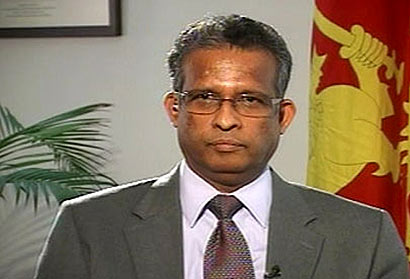Strong ties with India but dissonances creep in: envoy
 New Delhi, June 1 : India and Sri Lanka have "robust and strong relations" and New Delhi's vote against Colombo at a UN rights body was a "dissonance" between two friends, the Sri Lankan envoy has said.
New Delhi, June 1 : India and Sri Lanka have "robust and strong relations" and New Delhi's vote against Colombo at a UN rights body was a "dissonance" between two friends, the Sri Lankan envoy has said.
High Commissioner Prasad Kariyawasam also said his country was perfectly capable of developing "home-grown solutions" vis-a-vis the Tamil issue and "extra country interventions" would be counterproductive.
"With friends we agree and disagree on matters, like when the dissonance cropped up in the UNHRC (UN Human Rights Council) vote," Kariyawasam said at the Foreign Correspondents Club here Friday evening.
He said Sri Lanka would evolve its own solutions for its problems after discussions with all stakeholders. "Extra country interventions" would be counter productive and not be of help, he stressed.
India had voted for a US-sponsored resolution against Sri Lanka at the UN Human Rights Council March 21 over human rights violations and civilian killings during the war against the Tamil Tigers.
Kariyawasam said India and Sri Lanka has a "robust and strong relation and what is sometimes manifested in public sometimes does not reflect the strength of the relationship".
He spoke about India's help in building houses for Tamils displaced in the war, in de-mining areas held by the erstwhile Liberation Tigers of Tamil Eelam and in building a railway line in the island's north.
He said Sri Lanka and Tamil Nadu have also traditionally shared close relations but "aberrations" have crept in.
He accused Tamil diaspora groups who backed the LTTE of "trying to create a situation that is uncomfortable to Sri Lanka... We expect the aberration to get over".
"Our Tamils are our citizens and we are concerned about them. We want to build a Sri Lanka where Tamils, Sinhalese, Muslims all live in peace."
He appealed to "Tamil brothers" not to raise "counter-productive" issues like Tamil Eelam.
"Sri Lanka is looking at restorative justice and not retributive justice," he said. "Restoration of what is lost, and not retribution for who is responsible."
He said some in Sri Lanka were against devolution of powers to provincial councils.
He said there was no consensus on providing police powers to provinces. "We have discussed the issue and set up a Parliamentary Select Committee to thrash out the issue." (IANS)